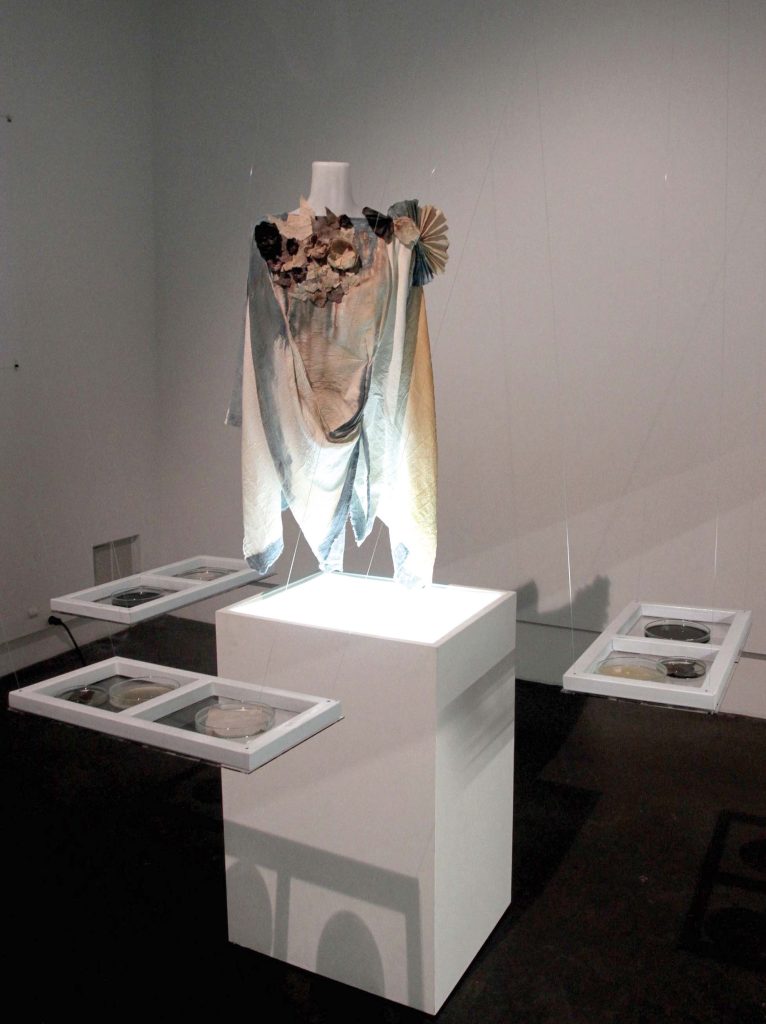
An all-female collective from Yogyakarta focuses on the exploration of art, science, and technology, The art collective is addressing environmental issues and empowering women to get a better grasp of science. Photos by XXLab.
XXLab was formed in 2014 by five women: Irene Agrivina, Asa Rahmana, Atinna Rizqiana, Eka Jayani, and Ratna Djuwita. This was ‘sparked’ after they all met at a basic electronics workshop catered for women in Yogyakarta the year before. The workshop called ‘Ms. Baltazar’s Laboratory ID’ (but run by an Austrian scientist by the name of Stefanie Wuschitz) was created to help women get a better understanding of basic electronics — and therefore reduce their reliance on men!
XXLab then grew as a collective for females from interdisciplinary backgrounds to explore art, science, and technology together. Among their projects is Soya C(o)u(l)ture which examines how soybean waste can processed into clothing and craft materials.

“We tried to make something circular, and as two of the five of us are designers, we created a new material for fashion. Our focus is on soybean waste as in Yogyakarta there are many tofu producers, whose waste is dumped straight into the river. This is causing heavy pollution, especially in the Bantul area. And there’s no solution: making drainage is very expensive, especially for the producers who are mostly cottage industries,” Irene Agrivina explained.
From their small laboratory, the group developed biomaterials from the basic ingredients of soybean liquid waste — which they call soya leather. The manufacturing process is carried out by cooking tofu wastewater with vinegar, sugar, and urea. Once cold, the water is placed on a tray and treated with Acetobacter xylinum bacteria to produce a natural cellulose fibre, commonly known as nata de soya. Within seven days, if done right, the cellulose will form and the sheets were drained to dry.

Nata de soya is a sheet of leather-like material that has qualities like cowhide, which is water-resistant, lightweight, not easily torn, and durable. After going through advanced processing, the cellulose fibre can be used as a raw material for eco-friendly fashion and handicraft products. The rest of the wastewater sediment can be used as fertiliser, even pieces of the material can be disposed of on the ground because it is are organic. Material processing is thus zero-waste.
These findings were then taught to a number of housewives in the Bantul area. The housewives took the tofu wastewater and managed to repeat the process of making the nata de soya. The material sheets were valued fairly well and were able to increase the income for these women.

“We provide an alternative to tofu waste treatment that is not only made from food but is a new material for fashion. Soya has a lot of potential; it can be made into paper so it doesn’t cut down trees and it can also be made into boards, so don’t have to cut down wood from the forest. But these are just our ideas from research, it needs investment.” Irene said.
XXLab’s Soya C(o)u(l)ture resulting soya leather won prestigious awards at the Prix Ars Electronica competition in Austria in May 2015, a competition on digital art and media. The judges were impressed with the concept of sustainable soya leather made from tofu wastewater. And their works have also been exhibited at PIKSEL14 in Norway (2014), ARTJOG 8 in Yogyakarta (2015), and Grow Kitchen in France (2015). Since then, XXLab has continued to receive invitations for collaboration from various large fashion brands.

“We apply open-source technology (software, hardware, and materials). We are very open where everyone can collaborate and work with us. We have indeed received many offers to collaborate, but this would actually be very good if it were applied by the Indonesian people in the form of designs. Here, the artisans are also involved. So, the crafter is encouraged to work closely with the designers and sell them as a finished product. Because if we sell only raw materials, we are only a supplier. And we are still open for product development. We would prefer this to be used as a state asset rather than being bought by world-renowned brands.” stated Irene.
Irene also emphasised that XXLab is not a business player, and the project needs to jointly build a business model because Irene and her friends are currently planning a collaborative concept to intensify production of soya leather as a raw material for eco-friendly fashion products, such as clothes, bags, shoes, and others.







